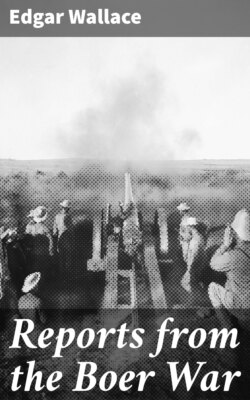Читать книгу Reports from the Boer War - Edgar Wallace - Страница 12
На сайте Литреса книга снята с продажи.
Оглавление WHY WE LOST DE WET
THREE GOOD REASONS
Table of Contents
Reproduced from The Star (New Zealand), May 16, 1901
Table of Contents
COLESBERG TOWN, March 4, 1901
De Wet being now safely across the river, and the odds against his returning being about 1000 to l, Colesberg is full of troops. White, Bruce-Hamilton, Plumer, Pilcher and others I cannot remember have been in and out for the last few days, and Henniker, Crabbe, Thorneycroft, and Monro are camped about the base of Suffolk Hill waiting for orders. De Wet has passed, he has swum the river in flood, losing about twenty men in the act, and he is moving to Fauresmith for all he is worth.
There can be no doubt that our operations have been most successful, and I am not trying to explain away the fact that we have lost the guerrilla chief when I say that we have accomplished all Lord Kitchener set us to do—namely, to drive De Wet back again to the Orange River Colony, to prevent him at all hazards penetrating south. On two occasions we might have caught him—or cornered his commando, for I doubt now whether De Wet himself will ever be taken—and on both occasion we failed for the same reason, viz., the total absence of any organised system of communication between the various columns.
A COMPLETE CORDON
De Wet's last few days in Cape Colony were the most fateful days he has ever spent, for it was touch-and.go with him whether he would be completely surrounded. Henniker, after leaving Petrusville with Crabbe, followed up De Wet to the Zand Drift, Thorneycroft being on Henniker's left. Hickman, moving up from Philipstown, came in touch with the enemy, but only with his rearguard, unfortunately. Haig and Williams were further south, and the question now was, Where was Byng?
Byng, as far as the columns knew, should be exactly in front, and this would have completed the cordon, Haig and Williams making a break south an impossibility. Byng had left Colesberg and, unknown to us, had struck De Wet's foreguard at a farm called Goodehoepe. He then sent a message to De Aar informing General Lyttelton, who commanded, and who seventy miles away was directing operations, and received either from that officer or from Pretoria direct an order to retire south to prevent De Wet moving in that direction. De Wet then moved over the ground which had been vacated, and reaching Lilliefontein crossed the river.
This in brief is what happened, and the question is, what would have prevented it and made De Wet's capture possible? I am informed that for two or three days Hickman, desirous of conveying and receiving information, had tried in vain to attract the attention of the officer commanding at Colesburg by heliograph. Coleskop, famous by reason of the guns French mounted thereon, is a landmark, and from, certain aspects can been seen for forty or fifty miles. Who, then, can blame Colonel Hickman for imagining that on this eminence, which is in a garrison town, there should be a staff of signallers?
THE SIGNAL THAT FAILED
There can be no doubt at all that had a signaller been stationed on Coleskop De Wet would have been caught. From such an eminence—using Coleskop as the exchanging medium—columns would have been able to communicate one with the other, instead of being forced to resort to the laborious, dangerous, and time-wasting method of sending messages through by despatch riders. To locate De Wet is simple enough, to place a cordon round him—that is, to put a force of men east, west, south and north of him—is not so very difficult. To instruct these men or columns to leave camp at a certain date and move in a given direction is the easiest thing in the world, but once let these columns get thirty miles from their starting points without means of rapid communication one with the other, and you have set a dozen blindfolded mutes from the four sides of a square to catch a wide-awake man in the centre.
WANTED CO-OPERATION
The telegraph line is unreliable, if, indeed, not impossible, in a district through which a hostile force is marching, and it is to the little circular mirror on the tripod that we must look for help.
There is no reason why a complete heliograph service should not be inaugurated throughout South Africa at least from De Aar northward. Each heliograph post could be held by reason of its position on the mountain by a company of infantry, and Lord Kitchener would be independent of the wire.
There are hundreds of mountains suitable for the purpose. I have already mentioned Coleskop, from which by two stages one is able to communicate with Thaba N'chu, in the east of Orange River Colony. The failure to capture De Wet may be traced to three sources.
The first, and most important, is the absolute failure of communication between columns and headquarters.
The second, the impossibility of a general conducting operations from a distance varying from thirty to seventy miles under such conditions.
The third, the temptation among column commanders to make the campaign against De Wet a competition rather than, a cooperated movement.
